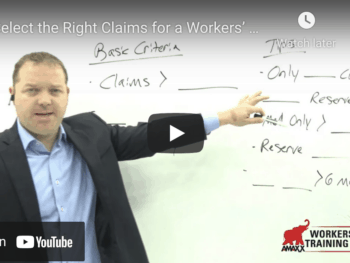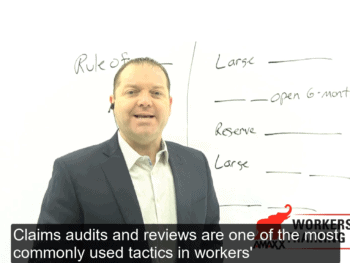
Click Link to Access Free PDF Download
“Workers’ Comp Claims Review Checklist: 9 Must-Have, Serious-Impact Elements”
20 Common Adjuster Mistakes
- The failure to thoroughly investigate the claims including the establishment of the nature and extent of the injuries.
- The failed to properly document the average weekly wage and to properly establish the TTD rate.
- The failure to maintain the files on a diary (a regularly scheduled file review by the adjuster to ensure all needed activity has been completed).
- The failure to recognize and document subrogation.
- The failure to have Action Plans.
- The failure to read medical reports.
- The failure to monitor and control medical treatment.
- The failure to conclude claims promptly when the opportunities were presented.
- The failure to know the workers’ compensation laws in their jurisdiction.
- Failing to file the appropriate state forms with the Industrial Commissions and Workers’ Compensation Boards.
- The failure to maintain contact and rapport with the claimants.
- The failure to record in the file notes the documentation received on the file.
- The failure to utilize Independent Medical Examinations when appropriate.
- The failure to utilize nurse case managers when appropriate.
- The failure to deny unrelated medical treatment or unrelated body parts when introduced into the claim.
- The failure to attempt to return injured employees to light duty work when the medical providers approved same.
- The failure to respond to important developments on the claims.
- The failure to provide proper litigation management on the litigated claims.
- The failure of management to provide supervision or guidance to the adjusters handling the claims.
- The failure of management to maintain continuity on the claims by changing the assigned adjuster on the claim during the claim. (Occasionally, it is necessary on a few files but not on a majority of the claim files).
What To Do About It
When mistakes occur in claims handling, the claim cost goes up. The insurance premium paid by employers is impacted by both the frequency and the severity of claims. While the frequency of claims carries greater weight in calculating the insurance premium, the severity of the claims – what the claims cost – also impacts the insurance premium.
There are several things employers can do to limit the mistakes made on workers’ compensation claims, including:
- Having a published set of Best Practices and insisting the claims office abide by them.’
- Having a designated or dedicated adjuster(s) to handle all your claims.
- Verifying the adjuster has reviewed the Employer’s First Report of Injury and has filed all appropriate forms on every claim.
- Verifying the adjuster has obtained the proper wage/salary information for calculating indemnity benefits (calculate the indemnity benefit yourself and compare it with what the adjuster is paying weekly or biweekly).
- Providing to the adjuster any information you have or receive about the claim, whether it is medical documentation, the employee’s personnel file or even scuttlebutt heard around the office.
- Establish a regular file review. (What gets reviewed gets done). If you do not have the time to review the adjuster(s) work yourself, hire an independent claim file auditor to review the files and identify the strong and weak points of the claims handling on your claims.

Contact: mstack@reduceyourworkerscomp.com.
Workers’ Comp Roundup Blog: https://blog.reduceyourworkerscomp.com/
©2023 Amaxx LLC. All rights reserved under International Copyright Law.
Do not use this information without independent verification. All state laws vary. You should consult with your insurance broker, attorney, or qualified professional.





























